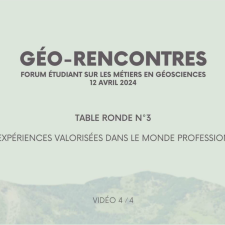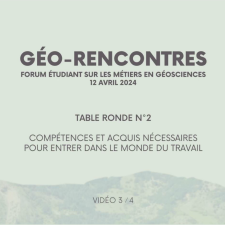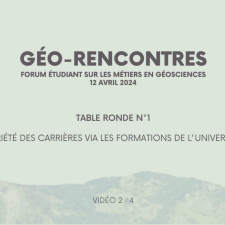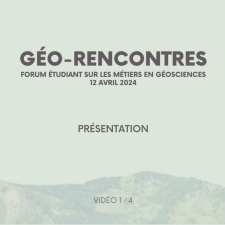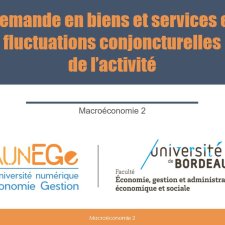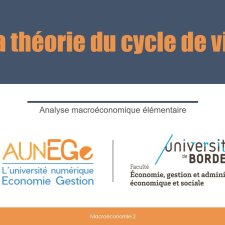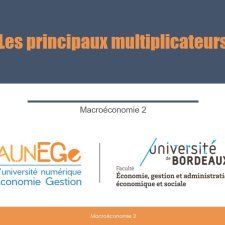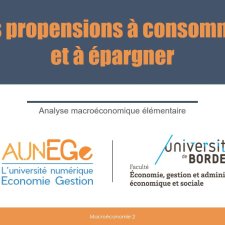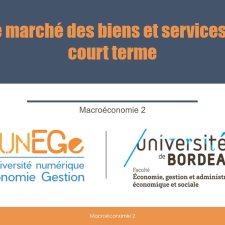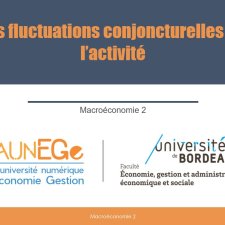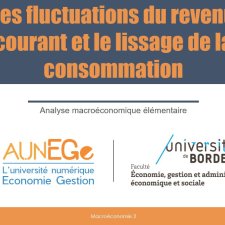Chapitres
Notice
The Intergenerational Equity: A Concept to Build for Sustainability, the Case of Global Warning
- document 1 document 2 document 3
- niveau 1 niveau 2 niveau 3
Descriptif
Defined as “the relation that each generation has with the last or future generations in the use... of the natural or cultural resources of planet”, Intergeneration equity (here I.E) imposes rules of optimal use of these resources on each generation. But it still remains a vague concept which needs a clear definition and poses some philosophical problems. Its emergence in right of the environment followed the scientific awakening on the ecological threats, in the years 1960 and led to a greater implication of the United Nations to coordinate international actions in environment field. The conferences of Stockholm in 1972 and Rio in 1992 answered this requirement and adopted the concept of sustainable development already mentioned in the 1987 Brundlandt report. With this concept, one attends “to provide for the needs of the present generation without compromising those of the future generations” trough the integration of the political economy and the environmental measures. This concept includes different aspects : the anguish of the present generation, the uncertainty characterizing the future one and also the practical difficulty to transmit the planet under conditions that ensure the survival of mankind and the defence of the common interest. So, its implementation should not be let to the individual actions of the States nor any bilateralism and multilateralism often in conflict with the “common interests of humanity” because principle of States sovereignty. Two possible ways can be explored to solve this institutional problem politically : The creation of a representative for the future generations to mitigate the absence of these generations in the current decision-making processes; or the creation of an international institution charged to protect the interests from the future generations and equipped with capacity higher than that of the States, as for the convention of Montego Bay signed in 1982 to control the activities of the 53 States in open sea and take care of the “common inheritance in the interest of the whole humanity”. The existence of such institutions would make it possible to force the States as well as the private individuals by preventing any contrary project with the interests of the future generations. How is this question perceived by the economic analysis? What are the philosophical background and the consequences on the analysis of global warming? In other words, is the choice of a discount rate efficient to solve the problem of different time periods posed by sustainability? To answer these questions, I suggest to analyze a typical long-term problem: the climate change, recently evoked in the Stern report (2006) and show that the policies of climate can lead to different models of consumption in time. And the very chosen strategy will depend on its effects on the households, today and in the future, evaluated through the impacts on the main indicators of wellbeing.
Intervention / Responsable scientifique
Dans la même collection
-
Holocene Climatic Changes and Their Effect on Morphodynamics and Sedimentation in Campania
AmatoVincenzoHigh-resolution paleoclimatic studies (e.g. 18O, 13C, CH4, MS, ect) provide 38 detailed reconstructions of the Holocene climatic variability, but they don’t are unable to provide direct informations
-
Debate
JoussaumeSylviePlantonSergeGonzales RoucoJesus FelipeGoosseHughesReissellAnniBrasseurGuyThe European Science Foundation (ESF) and the French Foundation of the Maison des Sciences de l’Homme (FMSH) (within the Entre-Sciences programme) have agreed to jointly develop a new conference
-
Linking Adaptation and Mitigation for Climate Risk Reduction
ShogrenJason F.How people privately and collectively adapt to climate risk can affect the costs and benefits of public mitigation policy (e.g., Kyoto); an obvious point often neglected in actual policy making.
-
Social Impact of global Environmental Change on Farming Communities on the Ogoli River Bank in Otuk…
Anjeinu AbuGodwinOne of the manifestations of the global change in this study area is a marked reduction in the duration and amount of rainfall. This adversely affects the volume of the head waters that ultimately
-
How to Foster the Economic and Societal Technical Solutions?
CallonecGaëlThe presentation will focus on the interplay between economic scenarios (based on energy demand and CO2 emission reduction) with long run-public policies. The French case will be discussed in more
-
IPCC Working Group I
SomervilleRichardThe European Science Foundation (ESF) and the French Foundation of the Maison des Sciences de l’Homme (FMSH) (within the Entre-Sciences programme) have agreed to jointly develop a new conference
-
Conference Opening
GuiotJoëlLauberVolkmarThe European Science Foundation (ESF) and the French Foundation of the Maison des Sciences de l’Homme (FMSH) (within the Entre-Sciences programme) have agreed to jointly develop a new conference
-
From Climate Models to Earth System Models
BrasseurGuyComplex climate models that describe the evolution of the coupled ocean atmosphere cryosphere system are gradually extended to “non physical” components of the earth system, and account for land
-
Are European Ecosystems Vulnerable to Climate Change
CramerWolfgangThe relatively simple question posed by this title turns out to be complicated in its implementation, for a number of reasons: First, ecosystems have changed in response to changing climate throughout
-
The Impacts of Climate Change on Continental Ecosystems
SeguinBernardClimate change will deeply modify the ecophysiological functioningof plants, by creating a set of conditions which could be more favourable (in the sense of biomass production) or not. Among the first
-
The Economics of the Climate/Development of the Gordian Knot; Beyond a Sound Pessimism
HourcadeJean-CharlesWe will first suggest that costs of meeting ambitious climate targets capable to stabilize global warming below 2°C or 3°C temperature increase have been underestimated so far. The first reason is the
-
Debate
CallonecGaëlDupuisJohannThoronSylvieThe European Science Foundation (ESF) and the French Foundation of the Maison des Sciences de l’Homme (FMSH) (within the Entre-Sciences programme) have agreed to jointly develop a new conference
Avec les mêmes intervenants et intervenantes
-
Debate
DjédjéOkoubi Franck DidierMillnerAntonyRaj AryalKomalFragnièreAugustinThe European Science Foundation (ESF) and the French Foundation of the Maison des Sciences de l’Homme (FMSH) (within the Entre-Sciences programme) have agreed to jointly develop a new conference
Sur le même thème
-
Géo-Rencontres 2024 / Les expériences valorisées dans le monde professionnel
LilloEmmaAraujoJulieHuartFlorianDubreuRomainBuquetDamienChazalLauraBorieMarianeForum sur les métiers en géosciences organisé par les étudiants du CMI Ingénierie Géologique et Civile, Université de Bordeaux, 12 avril 2024
-
Géo-Rencontres 2024 / Compétences et acquis nécessaires pour entrer dans le monde du travail
BrinonJulietteAmoleFili-FenuaPretouFrédéricCampetHugoLiébauxAlbinDe AlemeidaMarie-LouPoirierAymericDufrenoyAudreyForum sur les métiers en géosciences organisé par les étudiants du CMI Ingénierie Géologique et Civile, Université de Bordeaux, 12 avril 2024
-
Géo-Rencontres 2024 / Variété des carrières via les formations de l'université
InguimbertDianeLacazeRomaneLemaitreLaurieChazalLauraMontjeanPascalPoudevigneJacquesPortefaixFrédéricForum sur les métiers en géosciences organisé par les étudiants du CMI Ingénierie Géologique et Civile, Université de Bordeaux, 12 avril 2024
-
Géo-Rencontres 2024 / Présentation
LatasteJean-FrançoisLavieThéoForum sur les métiers en géosciences organisé par les étudiants du CMI Ingénierie Géologique et Civile, Université de Bordeaux, 12 avril 2024
-
Tokyo, plus grande « ville » au monde : aménager et gouverner la démesure
Languillon-AusselRaphaëlAvec ses quelques trente-cinq millions d’habitants, Tokyo est la « ville » la plus peuplée au monde, et l’une des métropoles les plus riches. Cette présentation vise à décrire, analyser et expliquer,
-
Demande en biens et services et fluctuations conjoncturelles
Maveyraud-TricoireSamuelDemande en biens et services et fluctuations conjoncturelles
-
-
-
Les propensions à consommer et à épargner
Maveyraud-TricoireSamuelLes propensions à consommer et à épargner
-
Le marché des biens et services à court terme
Maveyraud-TricoireSamuelLe marché des biens et services à court terme
-
Les fluctuations conjoncturelles de l’activité
Maveyraud-TricoireSamuelLes fluctuations conjoncturelles de l’activité
-
Les fluctuations du revenu courant et le lissage de la consommation
Maveyraud-TricoireSamuelLes fluctuations du revenu courant et le lissage de la consommation



